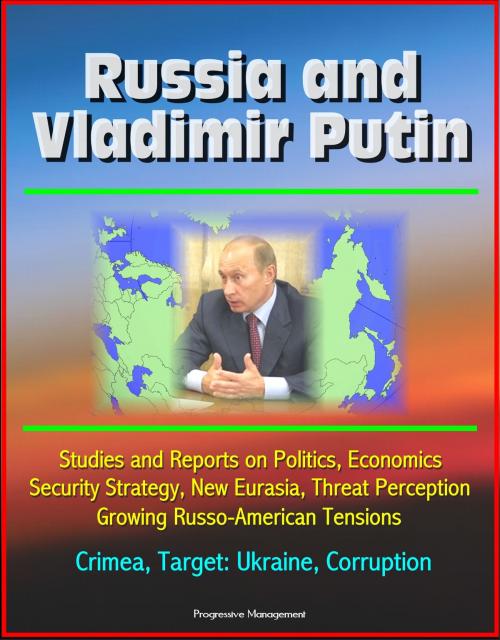Russia and Vladimir Putin: Studies and Reports on Politics, Economics, Security Strategy, New Eurasia, Threat Perception, Growing Russo-American Tensions, Crimea, Target: Ukraine, Corruption
Nonfiction, History, Military, Strategy, Asian, Russia| Author: | Progressive Management | ISBN: | 9781310315817 |
| Publisher: | Progressive Management | Publication: | March 10, 2014 |
| Imprint: | Smashwords Edition | Language: | English |
| Author: | Progressive Management |
| ISBN: | 9781310315817 |
| Publisher: | Progressive Management |
| Publication: | March 10, 2014 |
| Imprint: | Smashwords Edition |
| Language: | English |
Important reports and study papers by the U.S. Army's Strategic Studies Institute provide unique insights into Vladimir Putin's Russia, with special analysis and commentary of particular interest at this time of aggression against the Ukraine and Crimea. In addition to extensive discussions of security and economic issues, topics covered include authoritarianism, Yukos, corruption, the Russian educational system, Target: Ukraine, and Crimea.
Politics and Economics in Putin's Russia * Chapter 1 - Introduction: Politics and Economics in Putin's Russia: What do They Mean for the U.S. Army? * Chapter 2 - Russian Economic Reform 2012: "Deja vu All Over Again" * Chapter 3 - Economic Reform Under Putin 2.0: Will Petrodollars Suffice to Keep the Ship Afloat? * Chapter 4 - Authoritarianism and Modernization in Russia: Is Russia Ka-Putin? * Chapter 5 - Russia as a Pole of Power: Putin's Regional Integration Agenda * Russian Security Strategy Under Putin: U.S. and Russian Perspectives - U.S. Interests in the New Eurasia * Russia's Threat Perception and Strategic Posture
These essays point to the internal pathologies that render Russian security a precarious affair, at the best of times. The very fact of this precariousness makes Russia an inherently unpredictable and even potentially dangerous actor, not necessarily because it will actively attack its neighbors, though we certainly cannot exclude that possibility, but rather because it may come apart trying to play the role of a great power in Eurasia or elsewhere. As we all know, that outcome happened in 1917 and in 1989-91, with profound implications for international security and U.S. interests.
The strategic point at issue here goes beyond merely cataloguing Russia's deficiencies, many of which are well-known. These indicators should give early warning to analysts within the Army, the U.S. Government, and the broader society, if not abroad, about the fundamental problems of instability that lie at the foundation of Russian governance and security. Precisely because Russia is so important an actor in so many theaters and issue areas, any manifestation of that inherent unpredictability and instability should set alarm bells ringing. As we are now, according to many analysts, in a "risk society," it becomes incumbent upon us, if we are not to be unduly surprised, to diversify our risks and to develop greater understanding of the potential challenges that those risks could trigger.
For these reasons, these essays are a unique value. That value is not because they are provocative, which they are, but, as noted earlier, because they function as a kind of early warning to the U.S. Army and the U.S. Government that future scenarios may well involve contingencies that we do not wish to imagine at present but which we may be obliged to confront. Therefore, we must think about preventing them from growing into full-blown military contingencies while we can. If that effort ensures and owes something to these essays, then they will have served their purpose.
Demilitarization of Russian strategic thinking is a thing of the past. This, however, does not mean a return to the Cold War mentality. More likely, Russian strategic thinkers and practitioners are back 100-120 years in time, in the pre-World War I environment of ruthless strategic competition among the major powers.
Important reports and study papers by the U.S. Army's Strategic Studies Institute provide unique insights into Vladimir Putin's Russia, with special analysis and commentary of particular interest at this time of aggression against the Ukraine and Crimea. In addition to extensive discussions of security and economic issues, topics covered include authoritarianism, Yukos, corruption, the Russian educational system, Target: Ukraine, and Crimea.
Politics and Economics in Putin's Russia * Chapter 1 - Introduction: Politics and Economics in Putin's Russia: What do They Mean for the U.S. Army? * Chapter 2 - Russian Economic Reform 2012: "Deja vu All Over Again" * Chapter 3 - Economic Reform Under Putin 2.0: Will Petrodollars Suffice to Keep the Ship Afloat? * Chapter 4 - Authoritarianism and Modernization in Russia: Is Russia Ka-Putin? * Chapter 5 - Russia as a Pole of Power: Putin's Regional Integration Agenda * Russian Security Strategy Under Putin: U.S. and Russian Perspectives - U.S. Interests in the New Eurasia * Russia's Threat Perception and Strategic Posture
These essays point to the internal pathologies that render Russian security a precarious affair, at the best of times. The very fact of this precariousness makes Russia an inherently unpredictable and even potentially dangerous actor, not necessarily because it will actively attack its neighbors, though we certainly cannot exclude that possibility, but rather because it may come apart trying to play the role of a great power in Eurasia or elsewhere. As we all know, that outcome happened in 1917 and in 1989-91, with profound implications for international security and U.S. interests.
The strategic point at issue here goes beyond merely cataloguing Russia's deficiencies, many of which are well-known. These indicators should give early warning to analysts within the Army, the U.S. Government, and the broader society, if not abroad, about the fundamental problems of instability that lie at the foundation of Russian governance and security. Precisely because Russia is so important an actor in so many theaters and issue areas, any manifestation of that inherent unpredictability and instability should set alarm bells ringing. As we are now, according to many analysts, in a "risk society," it becomes incumbent upon us, if we are not to be unduly surprised, to diversify our risks and to develop greater understanding of the potential challenges that those risks could trigger.
For these reasons, these essays are a unique value. That value is not because they are provocative, which they are, but, as noted earlier, because they function as a kind of early warning to the U.S. Army and the U.S. Government that future scenarios may well involve contingencies that we do not wish to imagine at present but which we may be obliged to confront. Therefore, we must think about preventing them from growing into full-blown military contingencies while we can. If that effort ensures and owes something to these essays, then they will have served their purpose.
Demilitarization of Russian strategic thinking is a thing of the past. This, however, does not mean a return to the Cold War mentality. More likely, Russian strategic thinkers and practitioners are back 100-120 years in time, in the pre-World War I environment of ruthless strategic competition among the major powers.















